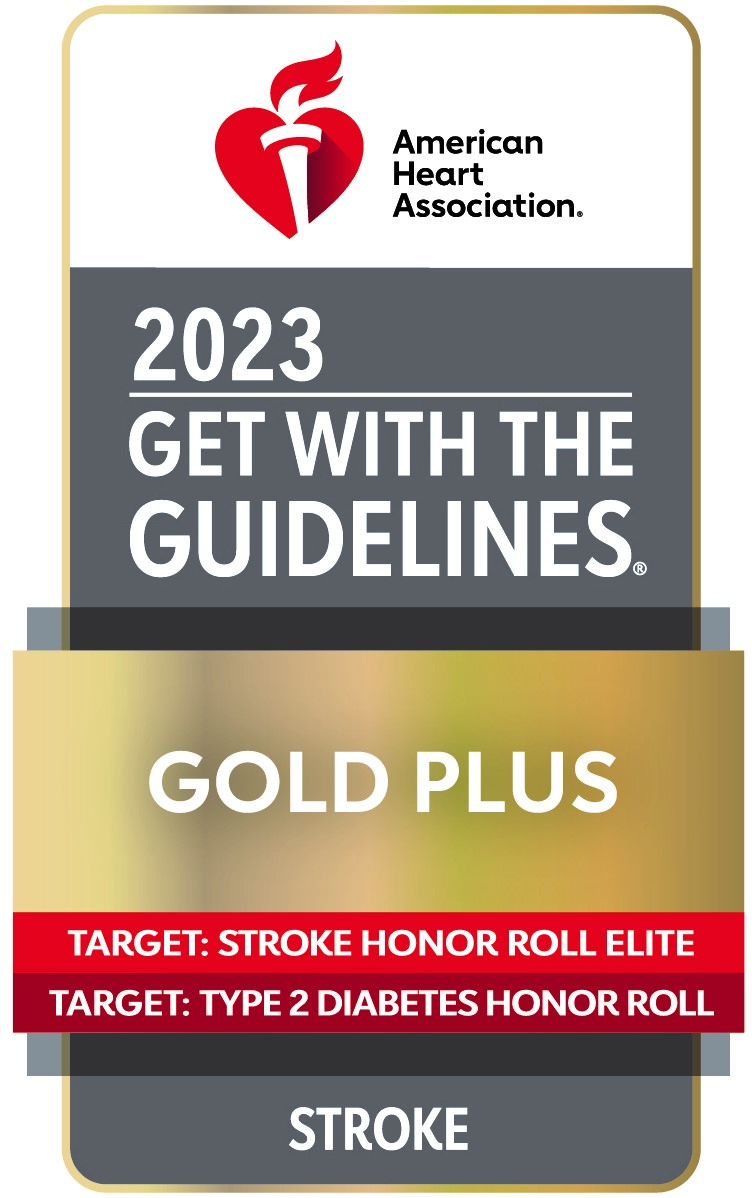
Overview
The stroke programs at TidalHealth Nanticoke and TidalHealth Peninsula Regional consist of highly experienced team who provide the best possible care to promote and achieve the best quality patient care and good patient outcomes.
A stroke happens when the blood supply to a part of the brain is cut off by a blockage or bursting of a blood vessel. When this happens, the affected brain cells start to die from a lack of oxygen and nutrients. The effects of a stroke depend on which part of the brain is damaged and how big of an area is injured. The damage to the brain can prevent a person’s brain from doing its job or specific functions.
Awards
TidalHealth Nanticoke

TidalHealth Nanticoke has received the American Heart Association's 2023 Get with the Guidelines Stroke Gold Plus quality achievement award for its commitment to ensuring stroke patients receive the most appropriate treatment. The Gold plus designation signifies the program utilizes the most up-to-date evidence-based treatment guidelines to improve patient care and outcomes in the communities we serve.
TidalHealth Peninsula Regional

TidalHealth Peninsula Regional has received the American Heart Association's 2023 Get with the Guidelines Stroke Gold Plus Stroke Honor Role quality achievement award for its commitment to ensuring stroke patients receive the most appropriate treatment according to nationally recognized, research-based guidelines, ultimately leading to more lives saved and reduced disability.
Primary Stroke Centers
TidalHealth Nanticoke Primary Stroke Center
The TidalHealth Nanticoke stroke program has been designated by the Joint Commission as a Primary Stroke center. This designation requires the Primary Stroke Center to meet and maintain specific requirements such as offering advanced stroke treatment options, maintaining a specialized healthcare team and offering community education to decrease the incidence of stroke. These requirements promote and achieve quality patient care and good patient outcomes.
TidalHealth Peninsula Regional Primary Stroke Center
The TidalHealth Peninsula Regional stroke program has been designated by the Joint Commission as an Advance Primary Stroke program. In addition, the Maryland Institute for Emergency Medical Services Systems (MIEMSS) has designated the program as a Maryland Primary Stroke Center.
Both designations require the TidalHealth Peninsula Regional Advanced Primary Stroke Center to meet and maintain specific requirements such as offering advanced stroke treatment options, maintaining a specialized healthcare team and offering community education to decrease the incidence of stroke. These requirements promote and achieve quality patient care and good patient outcomes.
Stroke Center Services
TidalHealth’s Primary Stroke Centers provide comprehensive stroke care from admission to the Emergency Department though discharge from the inpatient setting. Aspects of the stroke care treatment and services provided include
- A 24/7 acute stroke team: physicians, nurses, and technicians experienced in treating strokes team up in an emergency for anyone with stroke symptoms.
- Emergency Department staff experienced in diagnosing and treating stroke patients including communication with emergency medical responders in the pre-hospital setting.
- Emergency medical responders who work together with TidalHealth to ensure early communication of potential stroke victims.
- Emergency Department physicians qualified to administer t-PA, a “clot busting” medication, to appropriate stroke victims.
- Clot removal procedure (Thrombectomy) done at TidalHealth Peninsula Reginal.
- Written protocols and electronic ordering systems to speed up the diagnosis and treatment of stroke.
- 24/7 neuro-imaging services to quickly determine if a patient has a potential ischemic or hemorrhagic stroke.
- 24/7 laboratory services.
- Available cardiac imaging, such as echocardiograms.
- Quality metrics to monitor performance and improve our stroke program including use of a national registry (Get-With-The-Guidelines) as an important analysis tool.
- Continuing education for physicians and the clinical team who care for stroke victims during all phases of their care from emergency to discharge.
- Regular community education to spread stroke warning sign info, benefits of early intervention, risk factors and prevention
For patients needing specialized services like clot retrieval, this service is provided at TidalHealth Peninsula Regional. However, we are partnered Comprehensive Stroke Centers in both Maryland and Delaware to provide complex care to the stroke patient as needed.
Support Groups
TidalHealth Nanticoke and TidalHealth Peninsula Regional offers a Stroke Support group. The Support Group provides stroke education, support through experiences shared by other group members. The Stroke Support group is not only for the stroke survivor but caregivers as well.
TidalHealth Nanticoke
A support group is held monthly at TidalHealth Nanticoke for stroke survivors and their caregivers. For more information and dates, call 302-536-5299.
TidalHealth Peninsula Regional
A support group is held monthly at TidalHealth Peninsula Regional for stroke survivors and their caregivers. For more information and dates, call 410-912-7961.
Stroke Care Tips
If someone is showing signs of a stroke, call 911 immediately.
Seconds save brain cells and more time means more treatment options for them.
Remember the phrase BE FAST to help spot symptoms of a stroke.
B - Balance: is there a sudden loss of balance or coordination?
E - Eyes: is there sudden blurred or double vision or sudden, persistent vision trouble?
F - Face: ask the person to smile. Does one side of the face droop?
A - Arms: ask the person to raise both arms. Does one arm drift downward?
S - Speech: ask the person to repeat a simple phrase. Is their speech slurred or strange?
T - Time: if you see any of these symptoms, call 911 immediately.
Types of Stroke
There are three main types of Stroke. The information below will provide more information about each type of stroke.
Transient Ischemic Attack (TIA)
This type of stroke occurs when blood flow to part of the brain stops for a short period of time. The symptoms are the same as a stroke but usually last less than 24 hours. Though TIAs do not usually cause permanent damage, they are a warning sign that a stroke is may happen soon. The symptoms of a TIA should not be ignored, and it is important to seek medical attention.
Ischemic Stroke
This type of stroke is the most common type of stroke. It happens when a blood vessel in the brain is blocked and blood cannot reach that part of the brain. As a result those brain cells die. Multiple risk factors such as high blood pressure, diabetes, smoking, and lifestyle choices make a person more at risk for having a stroke.
Hemorrhagic Stroke
This type of stroke is less common and seen in about 15% of all strokes. Hemorrhagic strokes occur when a vessel in the brain bursts or leaks. The blood fills the area around the brain causing swelling and pressure, which can damage the cells and tissue of the brain.
Contact Us
TidalHealth Nanticoke
To learn more about the stroke programs services offered at TidalHealth Nanticoke, call 302-536-5299.
TidalHealth Peninsula Regional
To learn more about the stroke programs services offered at TidalHealth Peninsula Regional, call 410-912-7961.



